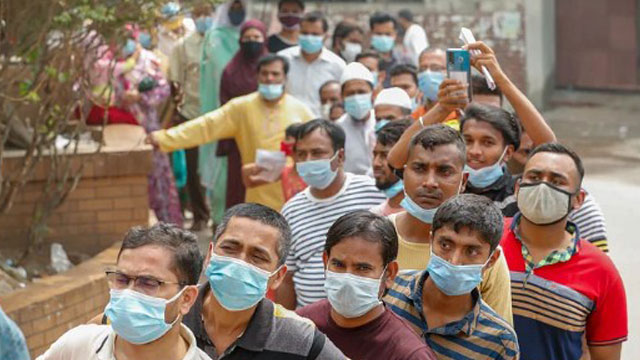Covid-19 transmission is escalating in Bangladesh and healthcare experts have urged the government to take immediate measures to curb the surge before it gets out of control.
The country recorded 2,172 new cases between Saturday and Sunday morning, a giant leap from the 1,868 cases recorded on Saturday, and the 1,159 last Sunday.
Furthermore, 22 deaths were recorded Sunday, taking the death toll from the pandemic in the country to 8,690.
Although the country has been experiencing the sudden surge of Covid-19 since early March, health authorities said they have yet to take a decision on imposing fresh lockdowns.
Healthcare officials and experts blame the surge in Covid-19 cases on people's reluctance to follow health safety guidelines.
On Saturday, the seven-day moving average for Covid deaths in Bangladesh rose above 20 for the first time since January 13. It remained steady at 20.71.
As recently as March 11, the seven-day moving average was still below 10. It has doubled in 10 days.
Eminent virologist Dr Nazrul Islam, vice-chancellor of Bangabandhu Sheikh Mujib Medical University, disagreed with the imposition of more lockdowns as they had proved completely ineffective in the country.
“The zonal approaches of lockdown at East Raza Bazar and Wari last year left us with bitter experiences,” he said.
“Imposing a lockdown is a foreign practice. We would never be able to implement it due to the suffering of our own people,” he said. “Rather the country can implement a local style of lockdown.”
Dr Nazrul Islam, a member of the National Technical Advisory Committee, said the imposition of restrictions on movement may still be a good idea considering the recent surge in cases.
“It will decrease movement after evening and proper monitoring could ensure wearing of masks by everyone. For the time being, following the health rules at offices and homes is a must,” he said.
Public Health expert Prof Dr Be-Nazir Ahmed, former director (disease control) of DGHS, said: “Lockdown is not the absolute solution for us, but the way young people are getting infected this time we might be forced to go for lockdown as there would be no space at the hospitals. The government must be desperate to stop the spread of the virus.”
He suggested stopping all public gatherings, regardless of whether they are for social or commercial reasons.
The book fair should be stopped immediately and all tourist spots should also be strictly monitored, if possible, he added.
“A partial, zone-based lockdown that would force very few people to be locked in with restrictions on movement should be the main task right now,” he said. “Besides, we need to ensure institutional quarantine and isolation on a priority basis, as our experiences say that isolation at home is not possible.





